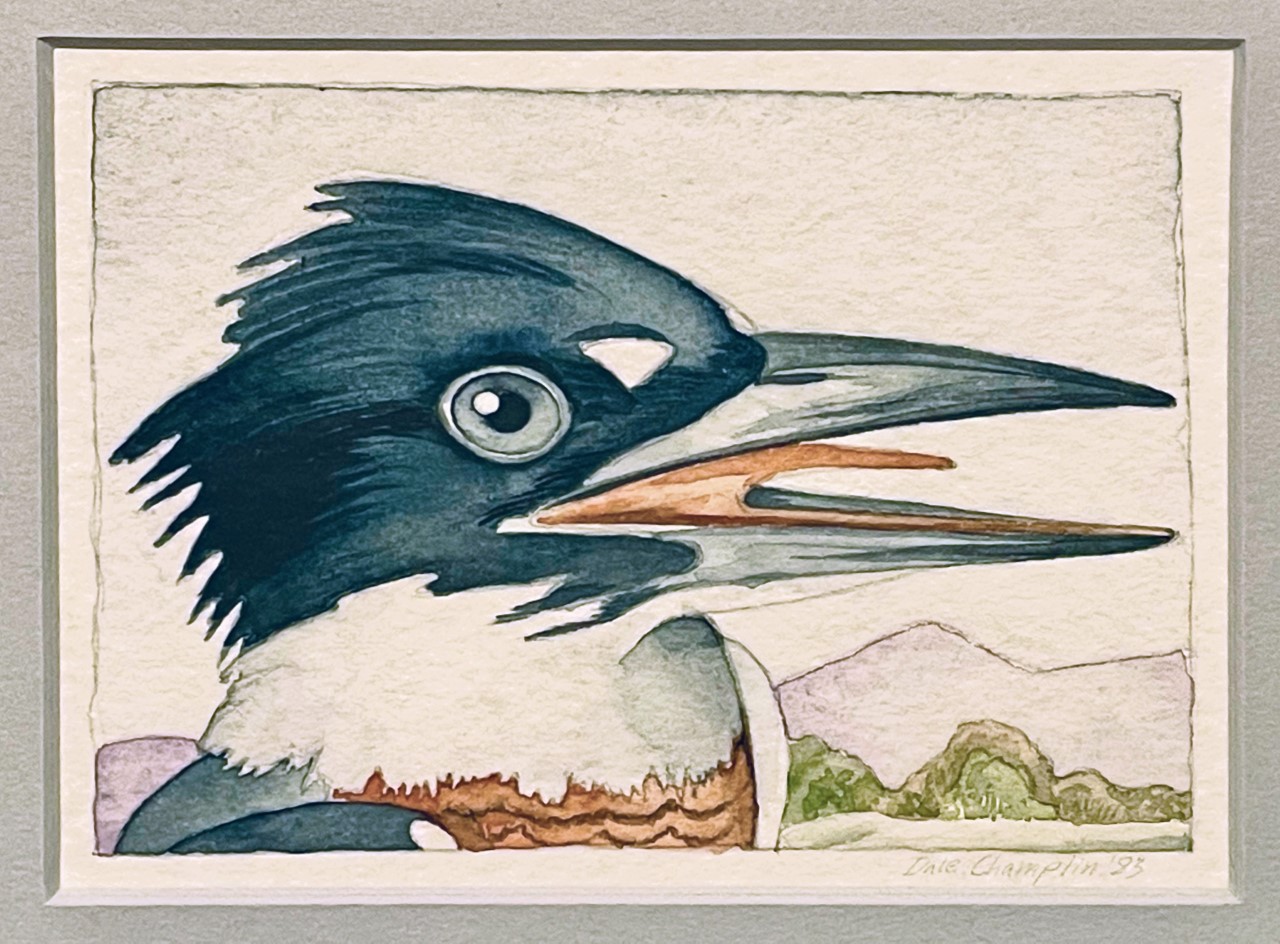 Dale Champlin, Kingfisher, Watercolor, 1983
Dale Champlin, Kingfisher, Watercolor, 1983
Issue #27 is dedicated to the memory of Erik Muller (1/7/1941-11/4/2021). He was a poet, critic, teacher and mentor to many
Why do we read and why do we write poetry? There are a thousand reasons, but I think what I’m most getting lately is that it’s to make intimate connection with others, and the unique thing about poetry is it can be done without the encumbrance or messiness of direct and personal relationship? In other words, intimacy at little or no cost? Through the intermediary of language and these made things, these artifacts of poetry, one person can connect with another, spanning near or far spatial distance, culture and even across vast periods of time, and without any prior connection—one is made privy to anothers potentially deepest most honest impressions, emotions and thoughts. A poem doesn’t have to be earth-shattering, or hugely significant, but it has to be a moment, has to offer some tiny moment of significance, beauty or recognition for the author to be able to translate to another. In this way poetry is a bit voyeuristic, or empathic. The poet makes and shapes a message to addresses some specific other, sometimes to or for themselves, or a general other: us? At best another receives or listens in. We get tired of ourselves or lost without the meaning to make of our situations? Poems help us find others quite different and exotic sometimes or similar out there in the wide world, and we find ourselves less lonely as a result. This connection seems to me to be what’s spiritual in poetry—the intimacy and connection, and the communication of other worlds and meaning. Sometimes, as with other mediums of art, the purpose is to stop time, sometimes to access eternity (and to pray and commune with the ultimate Other)–this too is spiritual. Everyone has to ask this question of the why of poetry for themselves, but when you’re an editor, to some degree it becomes a bigger question, more personal, and with higher stakes because others are involved and because you end up gathering voices, making decisions of what to include and what not, and a thing grows organically like a living thing. All this is partly contingent on factors outside one’s control even as the editor is supposedly responsible for curation.
Issue #27 developed over the course of a year (instead of the usual six months) because Jared Pearce edited #26 and so I had more time to work on this (not only during the six months he took to build his issue but also an additional six months to build mine). I was gathering poems. I’d say half of this issue has been contributed to and grew outside the normal means of submission, through a web of prior relationship with friends who are poets and artists who are busy going about their business and just welcomed me in to what they were working on. A good editor is always on the lookout for work to feed their communal project, otherwise known as a journal. It’s natural that out of this network of relationships comprised of individual poets and artists whose work deserves promotion I would want to add them to the mix for exposure to a wider audience than just me. It isn’t nepotism—it’s a community of relationships amongst working artists. When I was just starting out I never understood this. Then I thought it was about who was in and who was out, but now I realize it’s about awareness and relationship and connections amongst peers who are friends and respect and may even be nourished by what another is attempting. There’s nothing nefarious or conspiratorial going on. Now to me it is very sweet and one of the greatest rewards, to be able to curate an issue and place it before you, a reader or other contributor. It’s an artistic project, communal, and parts become greater wholes. All these little moments gathered into many and one bigger thing. And this became a very big thing with a very large variety of voices and very fine work. In times of division and crisis, I find gatherings and gestures toward unity become all the more important.
For you the reader, the size may seem daunting, but I can’t tell you how pleased I am with the beauty and variety and scope of this grand animal. We have Mexican and Russian work in translation, a generous selection of poems from David Appelbaum’s book that didn’t find placement previously in any journal. Some friends of mine from the Oregon Poetry Association (coincidentally) happened to submit work, others I tapped on the shoulder like Dale Champlin and Erik Muller because we were already sharing work with one another, and I had already been intending to feature Dale’s artwork for more than a year. And of course, for the work that was submitted through the normal channels, my editorial board (Jared and Massimo) works tirelessly commenting and helping me make decisions for selecting and building an issue. This issue has become quite a wild beast growing out of proportion perhaps due to circumstance and coincidences of connections, but I had no problem letting it, really. And I hope for you, this works toward a greater benefit. Please read straight through from start to finish, or skip around. Everything in this issue is dear to me. And as usual the result is purely a labor of love. Enjoy!
